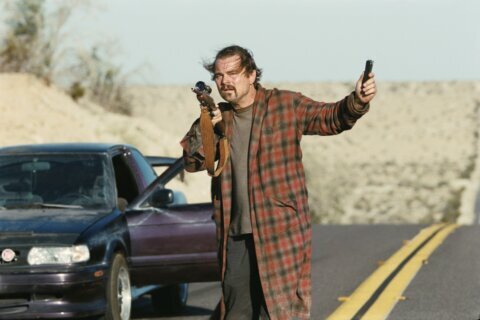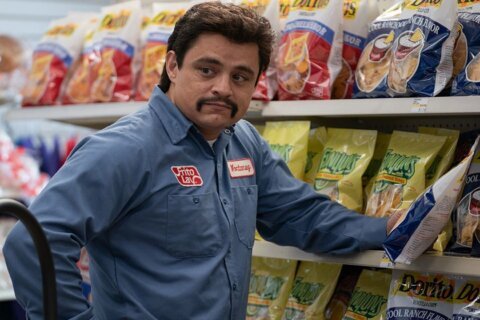WASHINGTON – Since the election of America’s first black president, race-related films have become perennial Best Picture contenders.
In 2009, it was “The Blind Side” and “Precious.” In 2011, it was “The Help.” Last year, it was “Lincoln” and “Django.” And this year, it could include “42,” “Fruitvale Station” and now “The Butler.”
How long will such movies be made? Should we ever move on? Or is it healthy to reexamine America’s original sin in the context of the present day?
Your political leanings may color your answers to these questions. All we can do as movie-goers is judge a film by the effectiveness of its message, and on this front, “The Butler” succeeds with enough heart, humor and history to overcome its time-lapse pace and heavy-handed finale.
Based on the true story of a Washington Post article, “The Butler” tells the tale of Cecil Gaines (Forest Whitaker), who watched his mother raped and father killed in America’s cotton fields. Later, he served as White House butler for eight presidents, including Dwight D. Eisenhower (Robin Williams), John F. Kennedy (James Marsden), Lyndon B. Johnson (Liev Schreiber), Richard Nixon (John Cusack) and Ronald Reagan (Alan Rickman). As such, Cecil has a front-row seat for major moments in American history, “Forrest Gump” style, all the while loving his wife Gloria (Oprah Winfrey) and clashing with his activist son Louis (David Oyelowo) on the forefront of the Civil Rights Movement.
After a summer of ridiculous explosions in “White House Down” and “Olympus Has Fallen,” it’s refreshing to see a realistic take on life at the White House, just as it’s sobering to see archival footage of bus explosions waged by the Klu Klux Klan. The ambitious premise to cover so much history could have blown up in the face of lesser filmmakers, but here they somehow pull it off.
The script is written by Danny Strong, who detailed the 2000 presidential election in HBO’s “Recount” (2008) and the 2008 presidential campaign in HBO’s “Game Change” (2012). He’s also been tapped to adapt the final two “Hunger Games” flicks, as well as Dan Brown’s “Lost Symbol.”
In “The Butler,” his script tackles ultra-serious material with a surprising amount of laugh-out-loud comedy. Case in point: Cecil visits a plantation and narrates, “We talk about concentration camps overseas, but we had our own right here for 200 years.” Just then, Cecil and Gloria step out of the car wearing hilarious ’80s windbreakers, both marking the era and providing relief from the heaviness.
Director Lee Daniels deserves equal credit for this tone. While the marketing of the title as “Lee Daniels’ The Butler” is frustratingly pretentious (you don’t see “Martin Scorsese’s Goodfellas” or “Spike Lee’s Do the Right Thing”), you can rest assured everyone will now know his name.
Daniels enlists pop culture montages in a mash-up of everything from “Soul Train” to “Sanford and Son.” He uses the image of a butler’s white gloves as a symbolic motif. He reclaims the crucifix as a symbol of peace, not a burning sign of KKK hate. And he uses the “mise-en-scene” of a Rubik’s cube (all colors aligned) as Cecil finally gets his equal pay justice after a string of attempts recalling Morgan Freeman’s “rehabilitation” pleas in “The Shawshank Redemption” (1994).
Of course, the other job of a director is working with the actors, and Daniels has a knack for inspiring great performances. He coached Mo’Nique to an Oscar win in “Precious” (2009) and directed Nicole Kidman to a Golden Globe nomination in “The Paperboy” (2012). Here, Daniels brilliantly orchestrates an ensemble cast that could very well win SAG’s big prize for Best Ensemble Cast, which ultimately led to Oscar Best Picture wins for “Argo,” “The King’s Speech,” “Slumdog Millionaire” and “Crash.”
The realistic family interactions unleash a hurricane of brilliant acting with Forest Whitaker and Oprah Winfrey in the eye of the storm. Both will deservedly get Oscar consideration, seven years after Whitaker’s win for “The Last King of Scotland” (2006) and 28 years after Oprah’s nomination for “The Color Purple” (1985). Whitaker plays Cecil with brilliant subtlety, embodying his generation’s mantra of working hard and not causing a scene (subversive subservience), while Winfrey plays a feisty housewife who could care less about politics as long as her kids stay out of trouble.
This generational clash comes to a head during a fabulous dinner scene where their activist son Louis brings his new girlfriend over for dinner, talking violence and sporting Black Panther outfits. As Cecil and Gloria discuss their love for the 1967 Best Picture “In the Heat of the Night” (1967), the radicalized Louis chirps that Sidney Poitier is a nothing more than a rich Uncle Tom.
“What are you talking about?” Cecil says. “He just won the Academy Award! He’s breaking down barriers for all of us.”
“Sorry, I didn’t mean to insult your hero, Mr. Butler,” Louis replies, getting slapped in the face (Poitier style) by his mother, thrown out by his father and made the butt of a “Guess Who’s Coming to Dinner” joke by his younger brother. Ultimately, Louis is pulled back from his more militant leanings, as the film sides with the Gandhi/King/Christ method of peaceful protest.
The rest of the supporting cast is a “who’s who” of the entertainment industry: Terrence Howard, Lenny Kravitz, Mariah Carey, Vanessa Redgrave, Jane Fonda and Minka Kelly.
Best of all is Cuba Gooding Jr., who appeared in Daniels’ directorial debut “Shadowboxer” (2005). After years off the radar, he is finally back to his lovable “Jerry Maguire” comic relief. Parents beware: his jokes are extremely sexual, but I found myself laughing uncontrollably.
While the family, friend and co-worker characters are inspired casting, the presidential choices are head-scratching. Robin Williams (Eisenhower), Liev Schreiber (LBJ) and John Cusack (Nixon) give valiant efforts, but their starpower is distracting. Alan Rickman comes a little closer to nailing Reagan’s vocal patterns, but James Marsden surprisingly comes the closest with the youthful exuberance of Kennedy. Perhaps this premise worked so well in “Gump” because the presidents were resurrected from archival footage, as opposed to actors playing such famous figures in the flesh.
How is each president portrayed politically?
Kennedy is painted as the film’s biggest hero, as he and Bobby have a change of heart after witnessing the Freedom Riders bus attack. We immediately cut to JFK’s famous speech on race, which ends in the shattered dreams of assassin bullets. This Kennedy segment is cleverly juxtaposed with Terrence Howard’s attempt of a love affair with Oprah, hinting at infidelity in the Kennedy era.
LBJ once again becomes the “butt” of a cinema joke. It wasn’t enough for Forrest to moon him in “Gump,” he’s now shown sitting on the toilet with his dogs. His portrayal is more of a mixed bag, shown as both a hero for passing the most important civil rights legislation since Lincoln abolished slavery — the Civil Rights Act of 1964 and the Voting Rights Act of 1965 — and condemned for the Vietnam War, about which Cecil says, “I don’t know why we were there in the first place.”
As for the Republicans, Nixon is the only one portrayed in a purely negative light, sweating, panicking and bribing votes. Eisenhower comes across as artistic and open-minded, while Reagan is given many likable moments behind the scenes. He slips Cecil a bonus check, helps him obtain equal pay and invites him and his wife to a state dinner, not as servants, but as guests.
At the same time, the film acknowledges the policy decisions that lost his trust among African Americans, like vetoing sanctions against South Africa’s apartheid system as protestors shout, “Free Mandela!” He later confides in Cecil, saying, “I worry that I’m on the wrong side of history on this whole civil rights thing.” To use Cecil’s Holocaust analogy, it’s a sympathetic moment like Schindler saying, “I could have done more.” Compared to Compton kids shooting at a Reagan poster in “Boyz n the Hood” (1991), I’d say The Great Communicator fares pretty well in “The Butler.”
Jane Fonda’s casting as Nancy Reagan has already offended some who begrudge her as “Hanoi Jane.” If you fall into this camp, let me assure you that her screentime is brief and, contrary to what you might think, paints Nancy in a positive light. As an objective film critic, not beholden to either party, I have no problem with this. But, I do question Daniels’ decision to bring this story into the present day with “Yes We Can” T-shirts and a voice-over of President Obama carrying us into the end credits.
I understand why this was included. You can’t tell the history of race in America without the nation’s first black president. That’s like doing the history of rock ‘n roll without The Beatles. And yet, many folks will leave the theater feeling like Daniels overstayed his welcome to score political points, which is a shame because the film is so painstakingly fair up until that point.
Filmmakers should be like party guests: Arrive fashionably late and leave early. Like Spielberg’s “Lincoln” last year, Daniels’ “The Butler” lingers too long, including too many historical events with too much tidy hand-holding. Hollywood needs to learn more tact. Imagine the power if Daniels had instead counted down to President Obama’s election, with father and son watching teary-eyed from the couch, and just seconds before the election is called, pulling a “Sopranos” and cutting abruptly to “black.”
Which brings us back to our original question: How long will race-related movies be made?
I suppose as long as racism exists. American cinema has grappled with this issue for decades: “The Searchers,” “Giant,” “The Defiant Ones,” “A Raisin in the Sun,” “To Kill a Mockingbird,” “In the Heat of the Night,” “Guess Who’s Coming to Dinner,” “Roots,” “The Color Purple,” “Mississippi Burning,” “Do the Right Thing,” “Glory,” “Driving Miss Daisy,” “Boyz in the Hood,” “Malcom X,” “Remember the Titans” and “Crash.” More are on the way, like the upcoming Martin Luther King Jr. biopic at Dreamworks.
Before you start shouting “race baiting,” consider the bigger picture. Films about German white supremacy are still being made 60-plus years after World War II: “Schindler’s List” (1993), “Life is Beautiful” (1997), “The Pianist” (2002) and “Inglourious Basterds” (2007). It stands to reason then that films about American white supremacy are being made in 2013.
Remember, this month marks just the 50th anniversary of the March on Washington, where Dr. King dreamed that his kids would “one day live in a nation where they will not be judged by the color of their skin, but by the content of their character.” Many forget this is also the 50th anniversary of Gov. George Wallace saying, “Segregation now, segregation tomorrow, segregation forever.”
Fifty years. That’s the blink of an eye in the history of mankind. It happened in these filmmakers’ lifetimes. It happened in many of your lifetimes. Even if you’re too young to remember, it’s recent enough that today’s kids heard first-hand horror stories by their parents and grandparents.
That’s how fresh this wound is, how much healing still needs to be done. “The Butler” is just the latest in a long line of Hollywood healing attempts, as we the moviegoers seek a day when our movies will not be judged by their color, but by the content of their characters. Thankfully, this film has both.
★ ★ ★ 1/2
The above rating is based on a 4-star scale. Follow WTOP Film Critic Jason Fraley on Twitter @AboveTheJFray, read his blog The Film Spectrum or listen Friday mornings on 103.5 FM.
Follow @WTOP on Twitter.








